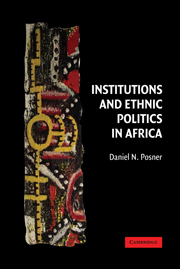Book contents
- Frontmatter
- Contents
- Preface
- INSTITUTIONS AND ETHNIC POLITICS IN AFRICA
- 1 Introduction
- I Introduction to Part I
- II Introduction to Part II
- 4 Ethnicity and Ethnic Politics in Zambia
- 5 Explaining Changing Patterns of Ethnic Politics
- III Introduction to Part III
- IV Introduction to Part IV
- Appendices
- Bibliography
- Index
- Titles in the series
5 - Explaining Changing Patterns of Ethnic Politics
A Model of Political Institutions and Ethnic Cleavage Outcomes
Published online by Cambridge University Press: 05 June 2012
- Frontmatter
- Contents
- Preface
- INSTITUTIONS AND ETHNIC POLITICS IN AFRICA
- 1 Introduction
- I Introduction to Part I
- II Introduction to Part II
- 4 Ethnicity and Ethnic Politics in Zambia
- 5 Explaining Changing Patterns of Ethnic Politics
- III Introduction to Part III
- IV Introduction to Part IV
- Appendices
- Bibliography
- Index
- Titles in the series
Summary
In 1984, Cherry Gertzel and her colleagues from the University of Zambia published a book, The Dynamics of the One-Party State in Zambia, whose purpose was to describe the origins and workings of the country's new single-party political system. Much of the book's analysis drew on a detailed study of the general election of 1973, the first contest held after the country suspended multi-party competition and moved to one-party rule. In the course of describing the campaign and interpreting the voting patterns that emerged in the 1973 race, the authors observed, almost in passing, that politicians seemed to be emphasizing, and voters seemed to be embracing, different kinds of ethnic identities than they had in 1968, the last election held under the old multi-party system. They noted that, whereas campaigning during the 1968 general election had revolved around the competition among broad, linguistically defined voting blocks, campaigning in 1973 seemed to revolve around the conflicts between local tribal groups. Whereas voters had overwhelmingly supported representatives of their language groups in the multi-party contest, they seemed to ignore language group distinctions and line up behind members of their tribes in the one-party race. It was not that ethnicity was more or less central in either election, for, as the authors made clear, it was highly salient in both. But the specific kinds of ethnic identities that served as bases of electoral competition and as motivations for political support were different.
- Type
- Chapter
- Information
- Institutions and Ethnic Politics in Africa , pp. 130 - 158Publisher: Cambridge University PressPrint publication year: 2005



